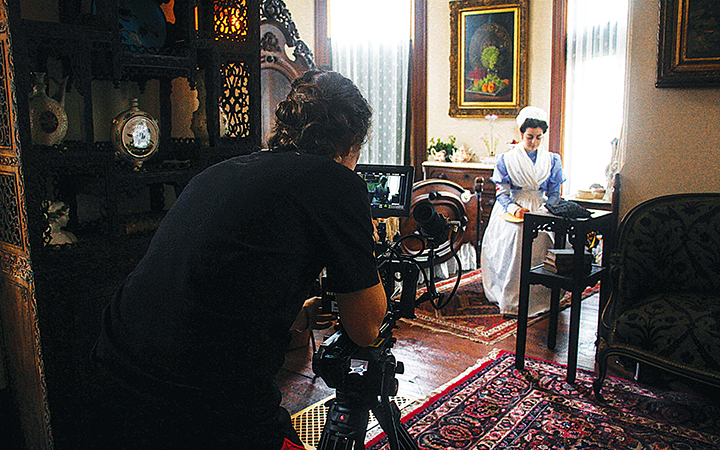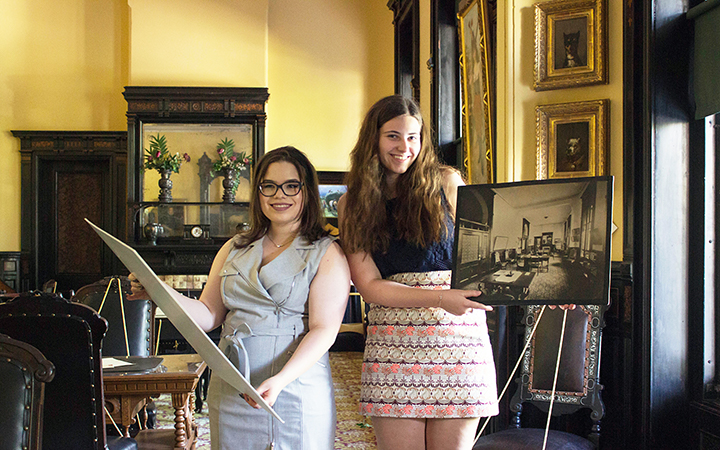
The Bachelor of Arts in History program is designed to help students see themselves and their society from different times and places, while displaying an informed perspective and a mature view of human nature. Students develop skills of analysis, including the ability to understand context, to understand change and continuity over time, and to draw conclusions from diffuse, fragmentary and biased sources.

As interns at the Henry B. Plant Museum, history majors Selena Martinez and Kaitlyn Stockdale created children’s guides to upcoming exhibits, conducted historical research for distribution on social media, digitized archival materials and led public tours.
History students learn about the major social, economic, political and cultural events of the past, and how those events connect to other events in history or today. The program also teaches students how to read and think critically, write and speak clearly and conduct research effectively. All history majors take two introductory survey courses and a core curriculum exploring approaches to history and research methods, culminating in a senior capstone research project.
In addition, history majors choose one of three concentrations:
- Standard concentration in history - Includes pre-modern and modern history covering a range of world regions.
- Global history and culture concentration - Includes coursework options in literature, religion, philosophy, languages, music and theatre.
- American history and law concentration - Emphasizes the study of American political and legal history, with course options in law, justice and advocacy.
Students in the B.A. in history study a range of topics that include:
- United States history
- History of Witchcraft
- European history
- History of natural disasters
- Asian history
- Public history and museum curatorship
- Middle Eastern and Islamic history
- History of gender and sexuality
- African history
- Women's history
- Latin American and Caribbean history
- Cultural history
- History of colonialism and imperialism
- Military history
A minor in history is also available.
 After earning a history degree at UT, Josie Bready '17 is currently working toward a Ph.D. in history at the University of Rochester, with the goal of becoming a professor. “As a history major at UT, it was awesome being able to attend class in such a historic building,” she said. “All of my professors influenced me greatly, and they helped me find opportunities such as the internship I completed at theTampa Bay History Center. They were also invaluable when I began applying to graduate school — something that would have been overwhelming without their help.To the incoming students at UT, I would say, don’t be afraid to talk to professors!"
After earning a history degree at UT, Josie Bready '17 is currently working toward a Ph.D. in history at the University of Rochester, with the goal of becoming a professor. “As a history major at UT, it was awesome being able to attend class in such a historic building,” she said. “All of my professors influenced me greatly, and they helped me find opportunities such as the internship I completed at theTampa Bay History Center. They were also invaluable when I began applying to graduate school — something that would have been overwhelming without their help.To the incoming students at UT, I would say, don’t be afraid to talk to professors!"
Other alumni have continued in their education pursing degrees in political science, law, and foreign policy. Students have also began working in the field at places such the Tampa Bay History Center and Georgia's Old Governor's Mansion.
The Tampa Bay area offers a rich range of institutions where students can learn by doing. Select history majors and geography minors receive the opportunity each semester to intern at the Henry B. Plant Museum (located on campus in Plant Hall), Tampa City Archives and Touchton Map Library at the Tampa Bay History Center. Students also benefit from applied learning experiences at the Florida Holocaust Museum, Tampa Theatre and Centro Español de TampCentro Español de Tampa.
Students also have the opportunity to participate in travel courses, such as when these students traveled to Morocco.
UT students in Associate Professor Charles McGraw Groh’s course designed and curated a temporary exhibit at the Henry B. Plant Museum in 2017. This exhibit was adapted to an online exhibit still avaliable on the Henry B. Plant Museum's website.
Students interested in the history degree as preparation for law school may also wish to consider combining the history major with a minor in Law, Justice, and Advocacy. The minor provides students with an opportunity to complete a course of study in substantive law at the undergraduate level. The interdisciplinary minor offers courses in business, criminal, constitutional, comparative and international law. The program is administered by the department of History, Sociology, Geography and Legal Studies.
Students should also declare their interest in law with Pre-Law Advising.
 The law, justice and advocacy minor offers a unique combination of experiential legal education and traditional academic inquiry. Area lawyers and judges train students to brief cases, advance through the stages of litigation in trial court and hone oral and written arguments. Pictured above are UT students in competition at the South Central Regional of the American Moot Court Association hosted by Texas Tech University School of Law.
The law, justice and advocacy minor offers a unique combination of experiential legal education and traditional academic inquiry. Area lawyers and judges train students to brief cases, advance through the stages of litigation in trial court and hone oral and written arguments. Pictured above are UT students in competition at the South Central Regional of the American Moot Court Association hosted by Texas Tech University School of Law.
Geography is a multidisciplinary field that studies the spatial patterns and dynamics of people, things and processes on the surface of the earth – including economic activity, natural resources, populations and political boundaries, settlements, cities and cultures. Coursework in geography prepares students well for a variety of careers in nonprofits, business and government in an increasingly global world.
UT’s chapter of the Phi Alpha Theta History Honor Society promotes the study of history by encouraging research, good teaching, publication and the exchange of learning and ideas among historians.
In a variety of ways, it brings students, teachers and writers of history together for intellectual and social exchange. The chapter presents the J. Ryan Beiser and C. Herbert Laub awards each year to outstanding history students.

